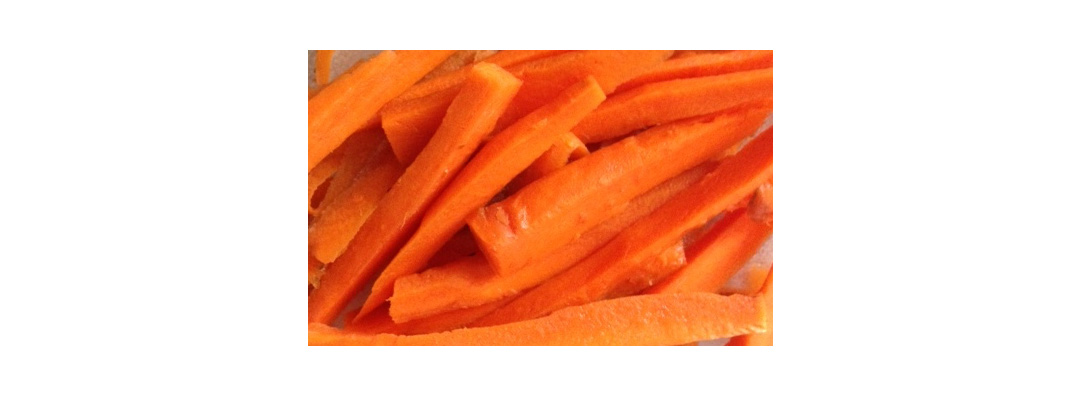A Nutritious Treat Horses Love
by Eleanor Blazer

What’s up, doc? Just like Bugs Bunny, many horses love carrots. Luckily, carrots are very nutritious and make a great treat.
Carrots are famous for improving sight. This theory got started during World War II. Britain’s Royal Air Force pilots supposedly ate large amounts of carrots. It was said this diet allowed them to see German bombers. But the truth was, the British had a new radar system. The rumor about the carrots was spread to protect the secrecy of the new detection system and explain why the British pilots were suddenly so successful at detecting the German bombers.
Despite this early rumor about carrots improving the eyesight of British pilots, they do contain large amounts of beta-carotene, so the story was somewhat based on fact. Beta-carotene is a precursor to vitamin A; this means the body converts it to vitamin A during digestion. Vitamin A is needed for healthy eyes, mucus membranes, normal bone growth, and healthy skin and hair.
Horses get most of their needed vitamin A from fresh pasture and top-quality alfalfa hay. Grass hay does not contain enough vitamin A to maintain normal levels throughout the winter. Commercial grains are fortified with vitamin A (manufacturers add it to the ration).
Carrots will not improve the eyesight of a horse that is not deficient in vitamin A. The National Research Council’s (2007) recommendations state a horse, at maintenance activity level, requires 30 IU (International Units) of vitamin A per each kilogram (2.2 pounds) of body weight per day. This means a 1,000-pound horse requires around 13,635 IUs of vitamin A each day. One pound of carrots contains 30,000 IUs of vitamin A.
Vitamin A can be toxic if over-supplemented. The NRC has determined the approximate upper safe limit of vitamin A at 16,000 IU/kg DM.
Vitamin A is a fat-soluble vitamin and is not flushed out of the system. The natural beta-carotene found in alfalfa hay, pasture and carrots has not been found to be toxic. The use of commercial supplements that contain vitamin A must be monitored to ensure over-supplementation does not occur.
Carrots are high in sugar. It is recommended that horses with Cushing’s syndrome (Pituitary Pars Intermedia Dysfunction), insulin resistance or equine polysaccharide storage myopathy (EPSM) avoid being fed large amounts of carrots… or any other treat containing high levels of soluble carbohydrates (sugar).
Be careful when feeding carrots so choke is not caused. Slicing the carrots into long thin slivers will prevent a large chunk from becoming lodged in the esophagus of the horse.
There have been a few isolated cases of horses acquiring a slight change of coat color when being fed large amounts of carrots; people who over-indulge in carrots can also acquire an orange tint. Once the carrot consumption is decreased the color will revert to the natural shade.
As always, when introducing a new feed to a horse, make the addition gradually and over a period of time. The microbes within the digestive system must be allowed to adjust to the new feed. A half of a carrot sliced thin twice a day is a good start. Then gradually work up to several carrots over a period of two weeks.
So, if you have a 1,000-pound rabbit in your barn that likes carrots, don’t worry… they are good for him—and you.
© 2017
* Proper nutrition and management practices can prevent many problems associated with caring for horses. You can learn how to provide your horse with a better life-style by taking the online course “How to Feed for Maximum Performance” taught by Eleanor Blazer. Go to www.horsecoursesonline.com for more information.
Originally Published December 2017 Issue

Eleanor Blazer was raised training and caring for horses. She learned to ride and care for the horses her family bought and sold. Many of these horses required improved nutrition when they arrived for training. Eleanor’s experience and research has benefited both horses and horse lovers in the field of equine nutrition. An equine nutrition consultant, based in Bulverde, Texas, she keeps busy doing equine nutrition consultations, conducting seminars, and speaking to youth groups about horse care and nutrition. Eleanor is the author of the syndicated column The Way of Horses. She has more than 20 years experience helping and being a mentor to those wanting to know how to provide the very best care and nutrition for our special friend – the horse.

